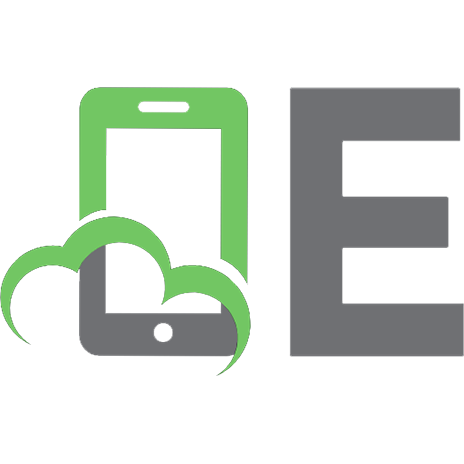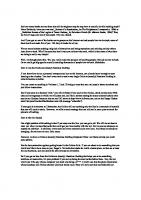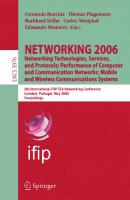Computer Networking: The Complete Beginner's Guide to Learning the Basics of Network Security, Computer Architecture, Wireless Technology and Communications Systems (Including Cisco, CCENT, and CCNA)
For courses in computer networking or introductions to networking at both the undergraduate and graduate level in comput
298 34 1MB
English Year 2019
Table of contents :
Cover
Title Page
Copyright Page
About the Authors
Preface
Contents
Chapter 1: Computer Networks and the Internet
1.1. What Is the Internet?
1.1.1. A Nuts-and-Bolts Description
1.1.2. A Services Description
1.1.3. What Is a Protocol?
1.2. The Network Edge
1.2.1. Access Networks
1.2.2. Physical Media
1.3. The Network Core
1.3.1. Packet Switching
1.3.2. Circuit Switching
1.3.3. A Network of Networks
1.4. Delay, Loss, and Throughput in Packet-Switched Networks
1.4.1. Overview of Delay in Packet-Switched Networks
1.4.2. Queuing Delay and Packet Loss
1.4.3. End-to-End Delay. 1.4.4. Throughput in Computer Networks1.5. Protocol Layers and Their Service Models
1.5.1. Layered Architecture
1.5.2. Encapsulation
1.6. Networks Under Attack
1.7. History of Computer Networking and the Internet
1.7.1. The Development of Packet Switching: 1961-1972
1.7.2. Proprietary Networks and Internetworking: 1972-1980
1.7.3. A Proliferation of Networks: 1980-1990
1.7.4. The Internet Explosion: The 1990s
1.7.5. The New Millennium
1.8. Summary
Homework Problems and Questions
Wireshark Lab
Interview: Leonard Kleinrock
Chapter 2: Application Layer. 2.1. Principles of Network Applications2.1.1. Network Application Architectures
2.1.2. Processes Communicating
2.1.3. Transport Services Available to Applications
2.1.4. Transport Services Provided by the Internet
2.1.5. Application-Layer Protocols
2.1.6. Network Applications Covered in This Book
2.2. The Web and HTTP
2.2.1. Overview of HTTP
2.2.2. Non-Persistent and Persistent Connections
2.2.3. HTTP Message Format
2.2.4. User-Server Interaction: Cookies
2.2.5. Web Caching
2.3. Electronic Mail in the Internet
2.3.1. SMTP
2.3.2. Comparison with HTTP
2.3.3. Mail Message Formats. 2.3.4. Mail Access Protocols2.4. DNS-The Internet's Directory Service
2.4.1. Services Provided by DNS
2.4.2. Overview of How DNS Works
2.4.3. DNS Records and Messages
2.5. Peer-to-Peer Applications
2.5.1. P2P File Distribution
2.6. Video Streaming and Content Distribution Networks
2.6.1. Internet Video
2.6.2. HTTP Streaming and DASH
2.6.3. Content Distribution Networks
2.6.4. Case Studies: Netflix, YouTube, and Kankan
2.7. Socket Programming: Creating Network Applications
2.7.1. Socket Programming with UDP
2.7.2. Socket Programming with TCP
2.8. Summary. Homework Problems and QuestionsSocket Programming Assignments
Wireshark Labs: HTTP, DNS
Interview: Marc Andreessen
Chapter 3: Transport Layer
3.1. Introduction and Transport-Layer Services
3.1.1. Relationship Between Transport and Network Layers
3.1.2. Overview of the Transport Layer in the Internet
3.2. Multiplexing and Demultiplexing
3.3. Connectionless Transport: UDP
3.3.1. UDP Segment Structure
3.3.2. UDP Checksum
3.4. Principles of Reliable Data Transfer
3.4.1. Building a Reliable Data Transfer Protocol
3.4.2. Pipelined Reliable Data Transfer Protocols.
Cover
Title Page
Copyright Page
About the Authors
Preface
Contents
Chapter 1: Computer Networks and the Internet
1.1. What Is the Internet?
1.1.1. A Nuts-and-Bolts Description
1.1.2. A Services Description
1.1.3. What Is a Protocol?
1.2. The Network Edge
1.2.1. Access Networks
1.2.2. Physical Media
1.3. The Network Core
1.3.1. Packet Switching
1.3.2. Circuit Switching
1.3.3. A Network of Networks
1.4. Delay, Loss, and Throughput in Packet-Switched Networks
1.4.1. Overview of Delay in Packet-Switched Networks
1.4.2. Queuing Delay and Packet Loss
1.4.3. End-to-End Delay. 1.4.4. Throughput in Computer Networks1.5. Protocol Layers and Their Service Models
1.5.1. Layered Architecture
1.5.2. Encapsulation
1.6. Networks Under Attack
1.7. History of Computer Networking and the Internet
1.7.1. The Development of Packet Switching: 1961-1972
1.7.2. Proprietary Networks and Internetworking: 1972-1980
1.7.3. A Proliferation of Networks: 1980-1990
1.7.4. The Internet Explosion: The 1990s
1.7.5. The New Millennium
1.8. Summary
Homework Problems and Questions
Wireshark Lab
Interview: Leonard Kleinrock
Chapter 2: Application Layer. 2.1. Principles of Network Applications2.1.1. Network Application Architectures
2.1.2. Processes Communicating
2.1.3. Transport Services Available to Applications
2.1.4. Transport Services Provided by the Internet
2.1.5. Application-Layer Protocols
2.1.6. Network Applications Covered in This Book
2.2. The Web and HTTP
2.2.1. Overview of HTTP
2.2.2. Non-Persistent and Persistent Connections
2.2.3. HTTP Message Format
2.2.4. User-Server Interaction: Cookies
2.2.5. Web Caching
2.3. Electronic Mail in the Internet
2.3.1. SMTP
2.3.2. Comparison with HTTP
2.3.3. Mail Message Formats. 2.3.4. Mail Access Protocols2.4. DNS-The Internet's Directory Service
2.4.1. Services Provided by DNS
2.4.2. Overview of How DNS Works
2.4.3. DNS Records and Messages
2.5. Peer-to-Peer Applications
2.5.1. P2P File Distribution
2.6. Video Streaming and Content Distribution Networks
2.6.1. Internet Video
2.6.2. HTTP Streaming and DASH
2.6.3. Content Distribution Networks
2.6.4. Case Studies: Netflix, YouTube, and Kankan
2.7. Socket Programming: Creating Network Applications
2.7.1. Socket Programming with UDP
2.7.2. Socket Programming with TCP
2.8. Summary. Homework Problems and QuestionsSocket Programming Assignments
Wireshark Labs: HTTP, DNS
Interview: Marc Andreessen
Chapter 3: Transport Layer
3.1. Introduction and Transport-Layer Services
3.1.1. Relationship Between Transport and Network Layers
3.1.2. Overview of the Transport Layer in the Internet
3.2. Multiplexing and Demultiplexing
3.3. Connectionless Transport: UDP
3.3.1. UDP Segment Structure
3.3.2. UDP Checksum
3.4. Principles of Reliable Data Transfer
3.4.1. Building a Reliable Data Transfer Protocol
3.4.2. Pipelined Reliable Data Transfer Protocols.





![Guide to Computer Network Security [6 ed.]
3031475488, 9783031475481](https://ebin.pub/img/200x200/guide-to-computer-network-security-6nbsped-3031475488-9783031475481.jpg)
![Guide to Computer Network Security [5° ed.]
3030381404, 9783030381400](https://ebin.pub/img/200x200/guide-to-computer-network-security-5nbsped-3030381404-9783030381400.jpg)



